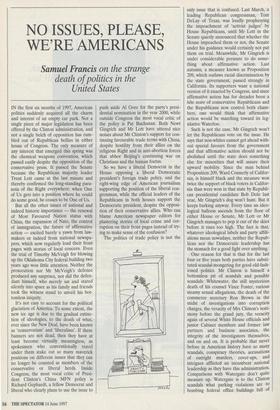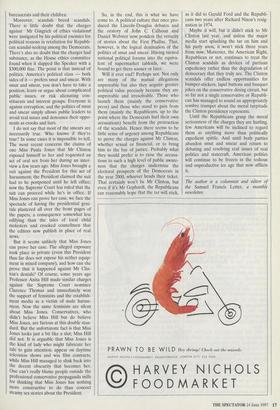NO ISSUES, PLEASE, WE'RE AMERICANS
Samuel Francis on the strange
death of politics in the United States
IN the first six months of 1997, American politics suddenly acquired all the charm and interest of an empty car park. Not a single piece of major legislation has been offered by the Clinton administration, and not a single belch of opposition has rum- bled out of Republican bellies in either house of Congress. The only measure of any interest that emerged this spring was the chemical weapons convention, which passed easily despite the opposition of the conservative press. It passed the Senate because the Republican majority leader Trent Lott came at the last minute and thereby confirmed the long-standing para- noia of the Right everywhere: when One of Us gets into a position where he could do some good, he ceases to be One of Us.
But all the other issues of national and indeed historic importance — the renewal of Most Favoured Nation status with China, the expansion of Nato, the control of immigration, the future of affirmative action — excited barely a yawn from law- makers or indeed from national newspa- pers, which now regularly load their front pages with stories of local concern. Even the trial of Timothy McVeigh for blowing up the Oklahoma City federal building two years ago won little attention. Neither the prosecution nor Mr McVeigh's defence produced any surprises, nor did the defen- dant himself, who merely sat and stared silently into space as his family and friends took the witness stand to unveil his bot- tomless iniquity.
It's not easy to account for the political glaciation of America. To some extent, the new ice age is due to the gradual extinc- tion of ideologies, to the death of what, ever since the New Deal, have been known as 'conservatism' and 'liberalism'. If these banners are not dead, then they have at least become virtually meaningless, as spokesmen who conventionally travel under them stake out so many maverick positions on different issues that they can no longer be counted as members of the conservative or liberal herds. Inside Congress, the most vocal critic of Presi- dent Clinton's China MFN policy is Richard Gephardt, a fellow Democrat and liberal who clearly plans to use the issue to push aside Al Gore for the party's presi- dential nomination in the year 2000, while outside Congress the most vocal critic of the policy is Pat Buchanan. Both Newt Gingrich and Mr Lott have uttered nice noises about Mr Clinton's support for con- tinuing favourable trade terms with China, despite hostility from their allies on the religious Right and in anti-abortion forces that abhor Beijing's continuing war on Christians and the human foetus.
So we have a liberal Democrat in the House opposing a liberal Democratic president's foreign trade policy, and the right-wing edge of American journalism supporting the position of the liberal con- gressman, while the official leaders of the Republicans in both houses support the Democratic president, despite the opposi- tion of their conservative allies. Who can blame American newspaper editors for plastering stories of local crime and cor- ruption on their front pages instead of try- ing to make sense of the confusion?
The .politics of trade policy is not the only issue that is confused. Last March, a leading Republican congressman, Tom DeLay of Texas, was loudly prophesying the impeachment of 'activist judges' by House Republicans, until Mr Lott in the Senate quietly announced that whether the House impeached them or not, the Senate under his guidance would certainly not put them on trial. Meanwhile, Mr Gingrich is under considerable pressure to do some- thing about affirmative action. Last autumn, a measure known as Proposition 209, which outlaws racial discrimination by the state government, passed strongly in California. Its supporters want a national version of it enacted by Congress, and since affirmative action has for decades been a bete noire of conservative Republicans and the Republicans now control both cham- bers, one would think that affirmative action would be marching toward its leg- islative Waterloo.
Such is not the case. Mr Gingrich won't let the Republicans vote on the issue. He says that non-whites cannot get ahead with- out special favours from the government and that affirmative action should not be abolished until the state does something else for minorities that will assure their upward mobility. Since the man behind Proposition 209, Ward Connerly of Califor- nia, is himself black and the measure won twice the support of black voters in Califor- nia than were won in that state by Republi- can presidential candidate Bob Dole last year, Mr Gingrich's dog won't hunt. But it keeps barking anyway. Every time an ideo- logical balloon ascends from the floor of either House or Senate, Mr Lott or Mr Gingrich manages to pop it out of the skies before it rises too high. The fact is that, whatever ideological labels and party affili- ations mean nowadays, neither the Repub- lican nor the Democratic leadership has the stomach for a good fight over anything.
One reason for that is that for the last four or five years both parties have substi- tuted scandal-mongering for good old-fash- ioned politics. Mr Clinton is himself a bottomless pit of scandals and possible scandals: Whitewater, the still mysterious death of his counsel Vince Foster, various steamy sexual allegations, the death of the commerce secretary Ron Brown in the midst of investigations into corruption charges, the veracity of Mrs Clinton's testi- mony before the grand jury, the veracity again of several White House officials and junior Cabinet members and former law partners and business associates, the integrity of the investigators themselves, and on and on. It is probable that never before in American history have so many scandals, conspiracy theories, accusations of outright murders, cover-ups, and intrigues afflicted an incumbent national leadership as they have this administration. Comparisons with Watergate don't quite measure up. Watergate is to the Clinton scandals what parking violations are to bombing federal office buildings full of bureaucrats and their children.
Moreover, scandals breed scandals. There is little doubt that the charges against Mr Gingrich of ethics violations were instigated by his political enemies for political reasons in retaliation for Republi- can scandal-seeking among the Democrats. There's also no doubt that the charges had substance, as the House ethics committee found when it slapped the Speaker with a $300,000 fine. The point is that instead of politics, America's political class — both sides of it — prefers smut and smear. With smut and smear, you don't have to take a position, learn or argue about complicated public issues, or risk alienating con- stituents and interest groups. Everyone is against corruption, and the politics of smut and smear simply allows public leaders to avoid real issues and denounce their oppo- nents as crooks and liars.
I do not say that most of the smears are necessarily true. Who knows if they're true? In some cases it is impossible to tell. The most recent concerns the claims of one Miss Paula Jones that Mr Clinton exposed himself to her and requested an act of oral sex from her during an inter- view a few years ago. Miss Jones brought a suit against the President for this act of harassment; the President claimed the suit had to be postponed until he left office; now the Supreme Court has ruled that the suit can proceed while he's in office. If Miss Jones can prove her case, we face the spectacle of having the presidential geni- tals plastered all over the front pages of the papers, a consequence somewhat less edifying than the tales of local child molesters and crooked councilmen that the editors now publish in place of real news.
But it seems unlikely that Miss Jones can prove her case. The alleged exposure took place in private (even this President thus far does not expose his nether equip- ment in mixed company), and how can she prove that it happened against Mr Clin- ton's denials? Of course, some years ago Professor Anita Hill made similar charges against the Supreme Court nominee Clarence Thomas and immediately won the support of feminists and the establish- ment media as a victim of male harass- ment. Now the same feminists are silent about Miss Jones. Conservatives, who didn't believe Miss Hill but do believe Miss Jones, are furious at this double stan- dard. But the unfortunate fact is that Miss Jones looks just a bit like a slut; Miss Hill did not. It is arguable that Miss Jones is the kind of lady who might fabricate her tale to gain attention, appear on daytime television shows and win film contracts, while Miss Hill managed to slink back into the decent obscurity that becomes her. One can't really blame people outside the professional conservative propaganda mills for thinking that Miss Jones has nothing more constructive to do than concoct steamy sex stories about the President. So, in the end, this is what we have come to. A political culture that once pro- duced the Lincoln-Douglas debates and the oratory of John C. Calhoun and Daniel Webster now ponders the veracity of stories about the First Phallus. That, however, is the logical destination of the politics of smut and smear. Having turned national political forums into the equiva- lent of supermarket tabloids, we were bound to get there sooner or later.
Will it ever end? Perhaps not. Not only are many of the mutual allegations unprovable but also they acquire greater political value precisely because they are unprovable and irresolvable. Those who launch them (mainly the conservative press) and those who stand to gain from them (mainly the Republicans, up to the point where the Democrats hurl their own accusations) benefit from the protraction of the scandals. Hence there seems to be little sense of urgency among Republicans to prove the charges against Mr Clinton, whether sexual or financial, or to bring him to the bar of justice. Probably what they would prefer is to raise the accusa- tions to such a high level of public aware- ness that the charges undermine the electoral prospects of the Democrats in the year 2000, whoever heads their ticket. That certainly won't be Mr Clinton, but even if it's Mr Gephardt, the Republicans can reasonably hope that the tar will stick, as it did to Ge,rald Ford and the Republi- cans two years after Richard Nixon's resig- nation in 1974.
Maybe it will, but it didn't stick to Mr Clinton last year, and unless the major media start splashing the tar on him and his party soon, it won't stick three years from now. Moreover, the American Right, Republican or not, continues to treat the Clinton scandals as devices of partisan expediency rather than the degradation of democracy that they truly are. The Clinton scandals offer endless opportunities for bumper-stickers, lapel buttons and banquet jokes on the conservative dining circuit, but so far not a single conservative or Republi- can has managed to sound an appropriately sombre trumpet about the moral turpitude the Clinton presidency represents.
Until the Republicans grasp the moral seriousness of the charges they are hurling, few Americans will be inclined to regard them as anything more than politically expedient spittle. And until both parties abandon smut and smear and return to debating and resolving real issues of real politics and statecraft, American politics will continue to be frozen in the tedious and unproductive ice age that now afflicts it.
The author is a columnist and editor of the Samuel Francis Letter, a monthly newsletter.











































































 Previous page
Previous page